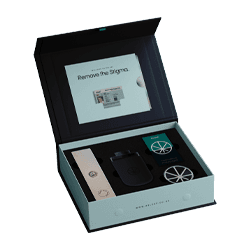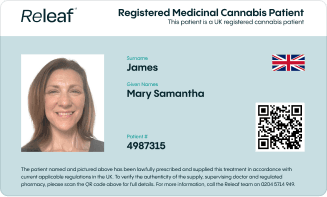Possessing medical cannabis on public transport
In the UK, medical cannabis patients are allowed to carry their prescribed medicine, including medical cannabis flowers and prescribed cannabis oil, on their person in public.
Although some patients may fear they will attract unwanted attention, or may be mistaken for possessing an illegal substance, simply possessing medical cannabis flower that has been prescribed to you in public, including in a train station, or on a bus, is not a crime in the UK.
But, it is advised that patients with a prescription for cannabis based products for medicinal use (CBPMs) carry their medicine in its original packaging because it features a prescription label, as well as a copy of their current prescription, so that they can prove they are acting completely within the law - should any issues arise.
So long as they are acting in accordance with the law and can prove this, a medical cannabis patient carrying medical cannabis in its original container with proof of its prescription is just as legal as carrying a packet of paracetamol in your pocket, or an asthma inhaler in your handbag, and should - in theory - be treated just the same.
At Releaf, we provide all our patients with their own medical cannabis card. Featuring a photo of the patient and a QR code, this card serves as a means of identification and can be scanned to access an up-to-date copy of the patient’s prescription, should they need to prove its legality.
Administering medical cannabis on public transport
In November last year, Drug Science, The University of York, Mackrell Solicitors, and Release - an independent registered charity that specialises in drug laws, published a guide for patients to help understand their legal rights when using medical cannabis.
This guide, titled ‘Know Your Rights: Medical Cannabis’ states:
“There is no legislation permitting or prohibiting the use of CBPMs indoors or on public transport. If a CBPM is consumed via a vaporiser, a similar device is an e-cigarette - there is also no legislation prohibiting the vaping of e-cigarettes indoor or elsewhere.
However, many public transport companies have policies that nonetheless prohibit vaping anywhere on their services (for instance, Transport for London). Additionally, other forms of public transport (such as aeroplanes) will prevent vaping on security grounds.All tubes, buses, and trains in London have banned electronic cigarettes.”
But, Drug Science’s guide also emphasises:
“While many members of the public may not like the smell of CBPMs when vaped and associate it with illegal activities, it is essential to remember that the vaporiser is a medical device which is necessary to provide medical treatment to an individual with a condition or disability.”
And so, because medical cannabis vaporisers are medical devices, and not e-cigarettes, they are not included in the current indoor smoking and vaping bans introduced by The UK Government’s 2006 Health Act, and those typically enforced by public transport companies.
Exercising common courtesy: medical cannabis and public transport
Many may now be asking, ‘can I vape cannabis on public transport if it's been prescribed to me?’
And although this is technically legal, it's not advised unless in the event of a medical emergency.
Even though medical cannabis vaporisers are excluded from indoor vaping and smoking legislations, most would agree that vaping in an enclosed space such as a train or on a bus should only ever happen in a rare, or serious situation out of common courtesy for other passengers, for example to avoid a seizure, or an event of incontinence.
Consider alternative administration methods
If you are prescribed medical cannabis flower and are planning a long journey using public transport, consider consulting with your doctor to see if a cannabis oil equivalent could appropriately meet your needs throughout the duration of your travel to avoid the use of a vaporiser.
Prescribed cannabis oils can be taken discreetly, and they don’t have any effect on others in the vicinity. Another plus is that prescribed cannabis oils have a longer lasting bioavailability than medical cannabis flower, and so their effects are longer lasting, and so, they don’t need to be administered as often.
Just like taking a tablet, taking prescribed cannabis oil on public transport will not affect others in the area, and is unlikely to even be noticed at all. Making this switch could be the solution to securing a stress-free journey, especially if you are prescribed cannabis-based treatments to manage conditions such as anxiety, and so, is worth considering.
Encountering issues: medical cannabis and public transport
To avoid encountering any issues on public transport, familiarise yourself with the policies the public transport provider you use upholds to keep yourself safe, and if you are a regular passenger perhaps consider speaking to them directly for further advice or information.
Although CBPMs were legalised for medicinal use in the UK back in 2018, our own research shows 59% of UK adults were unaware of this, and so, unfortunately, it is not uncommon for medical cannabis patients to be mistaken for acting illegally.
Therefore, we do advise against vaping in enclosed train carriages or public buses, unless strictly necessary. This not only is courteous to the other passengers around you, but will also help to avoid any unnecessary interactions with authorities or officials.
The ‘Know Your Rights: Medical Cannabis’ guidance states:
“If you have not been allowed to travel on public transport because of your CBPM, you may feel that you have been discrimination [sic] against in consequence of something arising from your disability.
Before pursuing any complaint or claim for discrimination, you should always obtain independent legal advice to clarify your rights in your particular circumstances.”
Closing considerations
In closing, it is perfectly legal for medical cannabis patients to carry their medicine on public transport in the UK, including on train station and bus station platforms, as well as on the bus and in carriages of trains, tubes, and trams.
But, when administering their cannabis-based treatments, medical cannabis patients should be mindful of public transport policies, and perhaps consider discreet alternatives to cannabis flower, like prescribed cannabis oil, for hassle-free travel.






